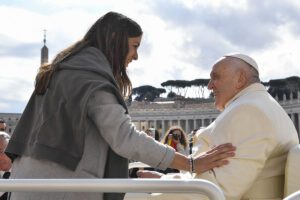VATICAN CITY (CNS) – During Lent this year, residents of the Domus Sanctae Marthae, where Pope Francis lives, decided to clean out their closets and give away things other people could use. “You can’t imagine how much stuff there was,” the pope said.
Leading his weekly general audience April 5, the pope said Holy Week is the perfect time to simplify one’s life and let go of things, especially of wounds, sin and past offenses that keep one from living in hope.
“Look at the wardrobe of your soul: How many useless things do you have, how many silly illusions?” he asked.
Pope Francis said that in his “other diocese,” Buenos Aires, when he would go around the city — “now I can’t do that because they won’t let me” — he would look at people’s faces and always was struck by how many seemed sad or completely distracted, “without peace, without hope.”

So, he said, the sadness and disappointment of Jesus’ disciples after his arrest and death are completely understandable to most people.
People wonder, “Why is there so much evil in the world – look, there is evil in the world. Why do inequalities continue to increase and why is that long-awaited peace not arriving? Why are we so attached to war, to hurting one another?” the pope said. “And there is the feeling that times gone by were better and that in the world, perhaps even in the church, things are not going the way they once were.”
Such thoughts, he said, are signs that “hope sometimes seems to be sealed behind the stone of mistrust” just as Jesus was sealed behind the stone of his tomb.
For Jesus’ disciples, then and now, the cross is the key to restoring hope.
The cross, “the most terrible instrument of torture,” is the greatest sign of God’s love, he said. “Having become the tree of life, that wood of death reminds us that God’s beginnings often begin with our ends.”
“In the black holes of our disappointed expectations,” the pope said, God’s love fills believers with a hope that never disappoints.
With the hope born of the cross, he said, people can be “healed of the sadness with which we are sick, be healed of the bitterness with which we pollute the church and the world.”
Through Jesus’ wounds God heals sinful humanity, Pope Francis said.
“We, too, are wounded; who isn’t wounded in life?” he said. “Who does not bear the scars of past choices, of misunderstandings, of hurts that stay inside and that we struggle to overcome?”
“God does not hide from our eyes the wounds that have pierced his body and soul. He shows them to show us that a new passage can be opened at Easter: to make of one’s wounds holes of light,” the pope said, before imagining someone responding, “But, Your Holiness, don’t exaggerate.”
Pope Francis told the crowd it was not an exaggeration.
“I ask you, what do you do with your wounds, the ones that only you know? You can let them fester in resentment, in sadness, or I can unite them with Jesus’ wounds, so that my wounds also become bright,” he said.
“Yes, our wounds can become springs of hope when, instead of feeling sorry for ourselves or hiding them, we dry the tears shed by others,” the pope said.
The choice, he said, is either to “lick my own wounds” or to reach out “to heal, to help others.”
At the end of the audience, Pope Francis asked people to spend time in Holy Week praying for the conversion of those who foment war.
And, thinking of Mary standing at the foot of the cross, he prayed for “the mothers of Ukrainian and Russian soldiers who have fallen in the war. They are mothers of dead sons. Let us pray for these mothers.”

